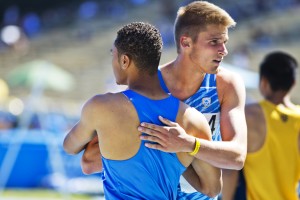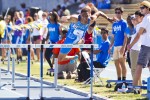UCLA’s track and field team is the biggest Division I sports team on campus in terms of roster size. There are 117 athletes on the team.
There are seven coaches.
“You usually have a sprint coach that coaches sprinters and a hurdles coach that coaches hurdles. But because our (college) group is so much bigger, it makes the task harder,” said freshman hurdler Misana Viltz.
That disparity between the number of coaches and players isn’t necessarily rare in college track and field, as many teams have a comparable ratio. But it means that certain coaches need to take on multiple roles at once.
Darrell Smith is one of those seven coaches. He was promoted from a volunteer coach position to the assistant sprints and hurdles coach in 2014, and helped bring in one of the best freshman recruit classes in the country in his first year on board.
But to do that – and still coach a multitude of athletes at UCLA – Smith didn’t have the luxury of flying around the country and taking recruiting visits like some Division I football coaches do in the offseason.
“For us, because we have a limited staff – I know football breaks it down to regions and areas (for recruiting) – (but) for us, we kind of work as a team,” Smith said.
Despite the limitations in travel and recruiting, Smith was still able to draw in some of the best freshmen sprinters and hurdlers from across the country: sprinter Leon Powell from Kennedale, Texas, sprinter Curtis Godin from Seal Beach and Viltz from Long Beach.
“It’s kind of funny – I developed most of my relationships with say like Curtis and Leon through email, and Misana as a matter of fact,” Smith said.
Other coaches, like associate coach and multi-events coach Jack Hoyt, would email athletes across the country, such as multi-events athlete Steele Wasik from Medina, Ohio.
“(Being recruited) was really interesting because … I had already had all my unofficial visits and was pretty much set on all that, and coach Hoyt shot me an email like a month into my senior year,” Wasik said. “He sent me a link to the online tour of the school, and I saw how beautiful it was. So I rearranged some trips and made it out here, and it was really last minute.”
But Wasik said that the weather and campus of UCLA were not what convinced him. It was the coaching staff.

“You see all the Olympians that are on staff, you see what kind of athletes they coach, and that kind of drew me into the school,” Wasik said.
The UCLA coaching staff may be small in size, but it is replete with experience and accolades. Smith has coached at three different Summer Olympics in his career, leading several athletes to medals, particularly in the 400-meter hurdles.
But after all that experience at the highest level of track and field, Smith decided to return to his alma mater to coach because of the unique challenges of coaching collegiate track and field. At UCLA, Smith no longer just trains the techniques of sprinters and hurdlers, but he also plays a role in helping them graduate and succeed academically, not to mention helping with recruitment along the way.
“Even though I’ve been coaching for 20 years … I’ve been on Olympics and world championships but this is a different aspect of chemistry,” Smith said. “It’s learning how to read the transcript or trying to figure out how this kid is gonna get out here on his own and make the most of his talent. … I’m enjoying it.”
Though Smith may still be learning on the job as many of the freshmen he recruited assimilate to the college level, he has already made an impact on at least one of his freshman athletes’ careers.
“Being in this environment makes everybody want to be better than themselves and go places in life. It just makes you want to work hard, it makes you want to be someone, it makes you want to go to the next level,” Viltz said.
Over the next four years, it won’t only be Viltz who grows, but Smith as well.
“What I really like is having this freshman class because we’ll get to grow together,” Smith said.
